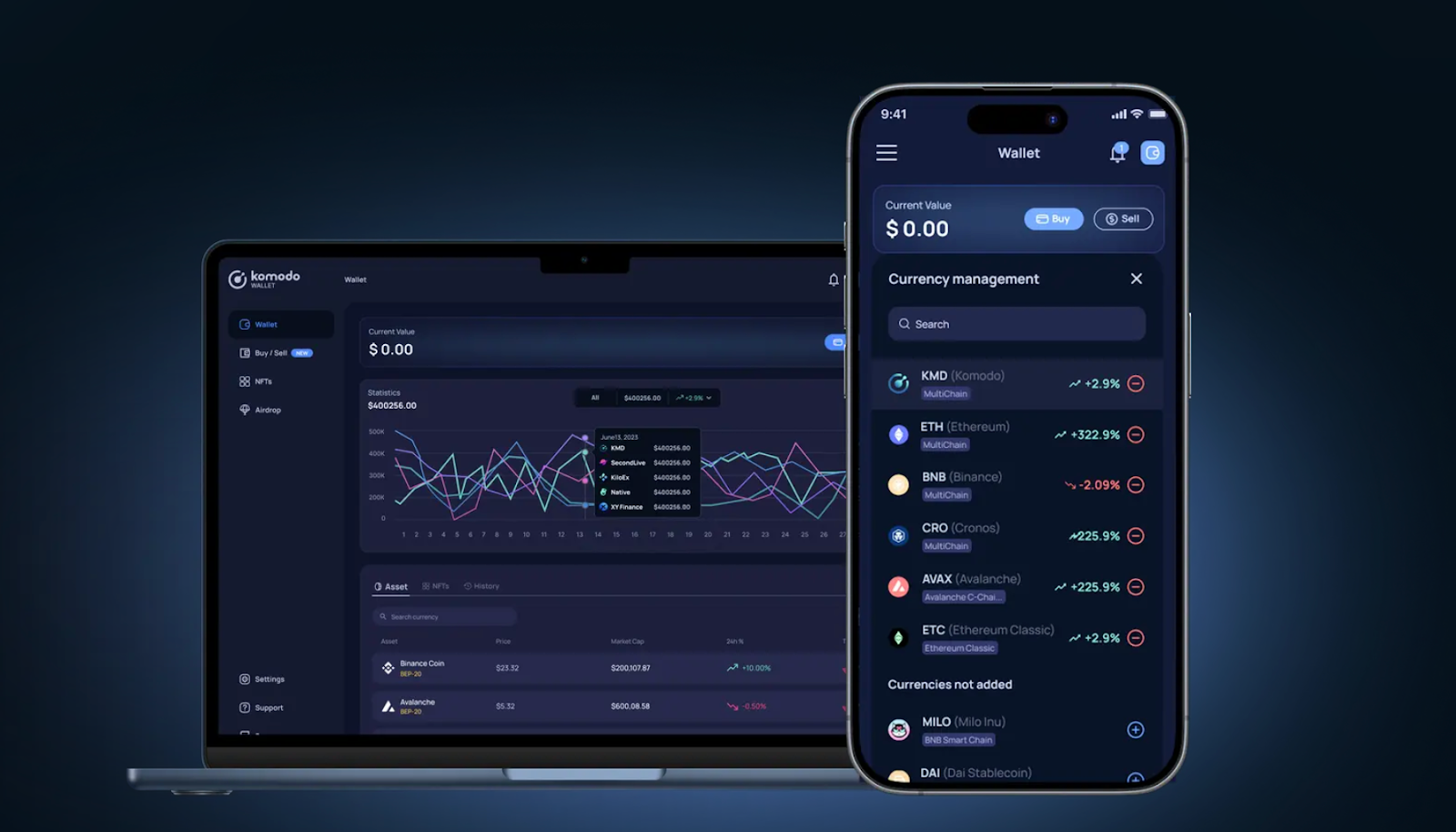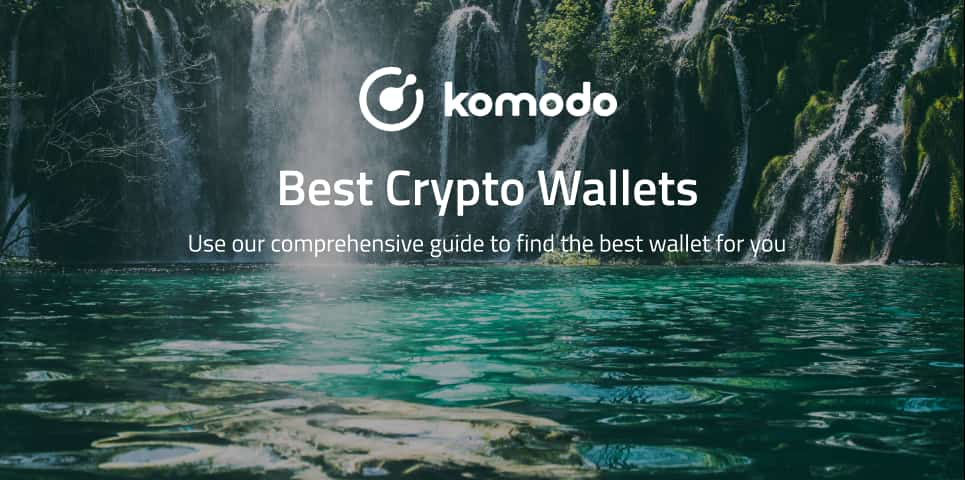Crypto wallets are somewhat misleading by the merit of their name. If you have cash in your physical wallet, it is a container for fiat paper notes. However, crypto wallets don't hold anything but your private key. In turn, this private key unlocks access to your crypto assets on the blockchain.
As cryptocurrencies become more popular, securing your digital assets becomes essential. Statista reports that global cryptocurrency wallet downloads grew by over 150% from 2020 to 2021 and rose by more than 320% by 2025. This rising interest shows a clear preference for wallets that put control in the hands of users. By using a decentralized wallet, you keep control of your private keys and enjoy safe access to your crypto across different devices.
From mobile apps to hardware wallets, decentralized wallets combine security, convenience, and flexibility, making them essential for both beginners and advanced crypto users.
Top Decentralized Crypto Wallets of 2025
Here’s a list of the leading non-custodial crypto wallets, with each wallet’s best feature highlighted:
- Komodo Wallet – Best for Multi-Chain Access and Atomic Swaps
- Exodus – Best for Cross-Platform Design and User Experience
- Guarda – Best for Web Wallet Flexibility and Multi-Asset Support
- Coinbase Wallet – Best for Security
- MetaMask – Best for DeFi and Ethereum-Based Transactions
- Coinomi – Best for Wide Asset Support and Privacy
- Edge Wallet – Best for Mobile Privacy and Ease of Use
- ZenGo – Best for Keyless Security and Account Recovery
- SafePal – Best for Hardware + Software Hybrid Security
- Trust Wallet – Best for Mobile Crypto and dApp Access
- Blockchain.com Wallet – Best for Optional Custodial Features
- MyCelium – Best for Bitcoin-Focused Security and SPV Transactions
Side-by-Side Comparison of Top Crypto Wallets
It’s one thing to review wallets individually, but the real value comes from seeing how they compare side by side. To help you make an informed decision, we’ve put together a direct comparison between crypto wallets.
The table below evaluates each wallet across the most important features that matter to both beginners and advanced users:
| Komodo Wallet | Trust Wallet | MetaMask | Exodus | Coinomi | Crypto.com | Guarda Wallet | Edge Wallet | SafePal | |
|---|---|---|---|---|---|---|---|---|---|
| Non-Custodial | ✓ | ✓ | ✓ | ✓ | ✓ | ✓ | ✓ | ✓ | ✓ |
| Open Source | ✓ | ✓ | ✓ | X | X | X | ✓ | X | ✓ |
| Mobile App | ✓ | ✓ | ✓ | ✓ | ✓ | ✓ | ✓ | ✓ | ✓ |
| Browser Extension | ✓ | ✓ | ✓ | ✓ | ✓ | ✓ | ✓ | X | ✓ |
| Desktop App | ✓ | X | X | ✓ | ✓ | X | X | X | X |
| Multi Language | ✓ | ✓ | ✓ | ✓ | ✓ | ✓ | ✓ | ✓ | X |
| Fiat On-Ramp | ✓ | ✓ | ✓ | ✓ | ✓ | ✓ | ✓ | ✓ | ✓ |
While many wallets offer strong capabilities, Komodo Wallet stands out with a complete feature set, combining cross-platform access, open-source transparency, and a built-in fiat on-ramp for a versatile crypto experience.
Komodo Wallet – Best for Multi-Chain Access and Atomic Swaps
Launched: 2016
Komodo Wallet is a 100% non-custodial multi-coin wallet that supports cross-chain swaps and complete private key control. It supports BTC, ETH, LTC, DOGE, and thousands of other assets across dozens of blockchains.
Features
- Non-Custodial
- Open Source
- Mobile App
- Desktop App
- Browser Extension
- Multi-Language
- Fiat On-Ramp
Pros
- Supports thousands of coins across dozens of blockchains
- Available on desktop, mobile, and web
- Regular updates and new feature additions
- Open-Source
- Fiat On-ramp integration for easy crypto purchases
Cons
- Currently no staking support

Exodus – Best for Cross-Platform Design and User Experience
Launched: 2015
Exodus offers an intuitive interface across desktop and mobile. It supports over 300 cryptocurrencies with simplified payment verification for fast, efficient transactions.
Features
- Non-Custodial
- Mobile App
- Desktop App
- Multi-Language
- Fiat On-Ramp
Pros
- Great design
- Full compatibility across devices and operating systems
- Over 300 cryptocurrencies supported as of 2025
- Regular updates
- Built-in fiat on-ramp
Cons
- Doesn't support multi-signature authentication
- Not entirely open source
- Custom fees only extended to Bitcoin, Ethereum, and ERC-20 tokens
Guarda – Best for Web Wallet Flexibility and Multi-Asset Support
Launched: 2017
Guarda offers web, mobile, and desktop access, supporting over 70 blockchains and 400,000 tokens. Ideal for DeFi users on Ethereum and Binance Smart Chain.
Features
- Non-Custodial
- Mobile App
- Browser Extension
- Desktop App
- Fiat On-Ramp
Pros
- Web wallet can connect to Ledger hardware wallet
- Exchange service on the go
- Sleek interface
- Crypto fees can be customized
- Supports staking for various cryptocurrencies.
Cons
- Doesn't support multi-signature authentication
- Custom fees are only extended to Bitcoin, Ethereum, and ERC-20 tokens
Coinbase Wallet – Best for Security
Launched: 2018
Coinbase Wallet allows full private key control with 2FA, pin code, and multi-signature features. Can connect seamlessly to Coinbase.com for on-chain transactions.
Features
- Non-Custodial
- Mobile App
- Browser Extension
- Desktop App
- Multi-Language
- Fiat On-Ramp
Pros
- High level of security features
- Supports major cryptocurrencies
- Connects to crypto vault to access Coinbase.com
- Integrated dApp Browser
Cons
- The Coinbase exchange is known for outages when high trading volume occurs
MetaMask – Best for DeFi and Ethereum-Based Transactions
Launched: 2016
MetaMask excels for Ethereum and Binance Smart Chain transactions, with in-browser dApp integration and built-in swap functionality.
Features
- Non-Custodial
- Open Source
- Mobile App
- Browser Extension
- Multi-Language
- Fiat On-Ramp
Pros
- Works seamlessly in-browser with various DeFi and NFT applications
- Widely adopted among developers building on Ethereum and Binance Smart Chain
- Has a built-in Swaps feature that combines data from decentralized exchange aggregators, market makers, and DEXs, to ensure best prices
- Easy wallet to stake funds or provide liquidity on DEXs like Uniswap exchange and PancakeSwap exchange
Cons
- Easy target for phishing attempts; less secure than other wallets
- Doesn't support assets beyond Ethereum, Binance Smart Chain, and other EVM blockchains. For example, UTXO assets like BTC, DOGE, ADA, etc. can't be held in MetaMask.
Coinomi – Best for Wide Asset Support and Privacy
Launched: 2014
Coinomi supports 1,700+ cryptocurrencies across 125+ blockchains with in-wallet exchange capability. Strong privacy reputation, never hacked.
Features
- Non-Custodial
- Mobile App
- Desktop App
- Multi-Language
- Fiat On-Ramp
Pros
- Vast asset support and in-wallet exchange capabilities
- Strong privacy focus and longstanding security reputation (never hacked)
- Dedicated round-the-clock support
Cons
- No cold storage option
- Closed-source development, limiting transparency
Edge Wallet – Best for Mobile Privacy and Ease of Use
Launched: 2017
Mobile-first non-custodial wallet emphasizing privacy and self-sovereignty.
Features
- Non-Custodial
- Mobile App
- Multi-Language
- Fiat On-Ramp
Pros
- Intuitive mobile interface with seamless setup
- Strong privacy and security: automatic encryption, backups, and 2FA support
- Built-in buy/sell and token exchange within the app
Cons
- Primarily limited to mobile - no dedicated desktop client

ZenGo – Best for Keyless Security and Account Recovery
Launched: 2019
Uses MPC technology to eliminate private key vulnerabilities while offering account recovery.
Features
- Non-Custodial
- Mobile App
- Fiat On-Ramp
Pros
- No seed-phrase risk, thanks to MPC-based security
- Recoverable accounts with strong user support
- Advanced features: multiple wallets, asset segregation, legacy transfer
- Highly rated by users for security and usability
Cons
SafePal - Best for Hardware + Software Hybrid Security
Launched: 2018
A dual-offering wallet ecosystem with both software wallets and air-gapped hardware wallets like the SafePal S1, S1 Pro, and X1. Hardware models provide top-tier security through offline signing and tamper detection, while software options offer mobile convenience.
Features
- Non-Custodial
- Mobile App
- Browser Extension
- Multi-Language
- Fiat On-Ramp
Pros
- Hardware wallets (S1/S1 Pro) are fully air-gapped (no Bluetooth, Wi-Fi, or USB), with tamper-proof chips and self-destruct mechanisms
- Supports wide asset range (30,000+ tokens across 100+ blockchains) and includes NFT/DeFi integration
- Combines hot (app/extension) and cold (hardware) wallet options for flexibility
Cons
- Hardware setup can have a learning curve, especially air-gapped process
- Some users have reported issues with software wallet uptime or support responsiveness
Trust Wallet - Best for Mobile Crypto and dApp Access
Launched: 2017
Trust Wallet has gained a reputation as one of the best mobile crypto wallets. However, it is more than that. It has a built-in Web3 browser that acts as a MetaMask wallet, allowing you to connect to DeFi protocols running on Ethereum. Moreover, it expanded the types of tokens it supports from ERC-20 and ERC-223 to Bitcoin as well.
Features
- Non-Custodial
- Open Source
- Mobile App
- Multi-Language
- Fiat On-Ramp
Pros
- Completely free
- Fingerprint scanning and PIN code
- Non-custodial
- Integrated dApp browser
- Supports over 100 blockchains and 10 million assets
Cons
- No desktop support
- Design not as elegant as it could be
- Limited custom fee settings
- No live customer support
Blockchain.com - Best for Optional Custodial Features
Launched: 2011
Blockchain.com is one of the oldest and widely spread crypto exchanges, covering 200 countries accessible by 89 million wallet addresses. The exchange offers two types of wallets: non-custodial, which allows you to hold your private key, and a custodial wallet for trading. The latter makes it possible to stake your crypto assets and earn interest.
Features
- Non-Custodial (optional)
- Mobile App
- Desktop App
- Multi-Language
- Fiat On-Ramp
Pros
- Transaction explorer for both Bitcoin and Ethereum blockchains
- Easy transition between custodial wallet and non-custodial wallet
- If the original account holder dies, it has a transfer protocol for the account to be passed on
Cons
- Limited Cryptocurrency Support
- No 24/7 tech support
MyCelium – Best for Bitcoin-Focused Security and SPV Transactions
Launched: 2013
MyCelium is the only company offering a blockchain product that existed before 2009. It has three core products: Gear, Entropy, and the MyCelium Wallet. With early momentum, this wallet became one of the most popular hot wallets, available on both Android and iOS devices.
Features
- Non-Custodial
- Mobile App
Pros
- Has its own exchange for in-person trades - MyCelium Local Trader
- Top-notch security features
- Multiple accounts on a single app
- Support for hardware wallets - Trezor, Ledger Nano S, and KeepKey
Cons
- Focused on Bitcoin only
- No desktop version
- User interface is not as easy for beginners
Crypto Wallet Market Trends and Growth Insights
Non-custodial wallets are experiencing rapid global adoption, with Statista data showing steady growth in monthly downloads from 2015 to 2025. The ten most popular cryptocurrency wallets recorded 2.2 million downloads in December 2020, which increased to 5.6 million in January 2021 and reached 23.6 million by July 2025, reflecting growing interest in secure, self-managed crypto solutions. As more people enter the market, selecting a wallet that offers strong security, easy accessibility, and seamless usability is becoming essential for both beginners and experienced crypto users.
How To Pick the Best Cryptocurrency Wallet?
Now that you know what crypto wallet options are available, it's time to decide which ones to pick. Ask yourself the following questions:
- Do you want the same wallet for both desktop and mobile? Then the Jaxx Liberty may be your best bet, regardless if you use iOS or Android.
- Do you only want the best mobile crypto wallet with a wide crypto range and dApp access? Trust Wallet is a fantastic online crypto wallet.
- Are you heavily involved with DeFi protocols and altcoins? Then Komodo Wallet is your best bet with thousands of coins available across dozens of blockchains.
- Do you intend to store your crypto assets for the long haul? Move away from hot wallets into cold storage - Trezor, KeepKey, and Ledger have the highest ratings.
Lastly, always keep in mind that safeguarding your private key is your personal responsibility, as well as storing or remembering your 12 or 24- word seed phrase for recovery of all crypto wallet types listed here. If you lose your private key or seed phrase, you may never be able to re-access your crypto holdings.
Matching Your Needs to the Right Crypto Wallet
Choosing the ideal crypto wallet depends on your unique priorities, whether that’s optimized security, quick accessibility, or overall ease of use.
The key is to find a wallet that balances security with convenience, giving you control without risking your assets’ safety. Komodo Wallet offers this balance through its fully non-custodial design, combining strong security with smooth cross-chain support.
Whether you need a wallet compatible with multiple cryptocurrencies or one that lets you maintain control over your private keys, Komodo Wallet delivers the flexibility, security, and user-friendly experience to suit your specific crypto storage and trading requirements.
FAQs
Can I store multiple cryptocurrencies in one wallet?
Yes, many modern wallets support multiple cryptocurrencies. These multi-currency wallets allow users to manage different types of coins and tokens, often across various blockchains, in one place. Examples include Komodo Wallet, Trust Wallet, and Exodus, which support Bitcoin, Ethereum, Litecoin, and many other assets.
What is a custodial wallet?
A custodial wallet is one where a third-party, usually an exchange or service provider, holds your private keys on your behalf. While custodial wallets offer convenience and ease of use, you are relying on the service to securely store your assets. Non-custodial wallets, on the other hand, give you full control of your private keys and are considered more secure since you hold custody of your assets.
Are mobile wallets safe to use?
Mobile wallets can be safe if proper precautions are taken. Always download wallet apps from official stores (Google Play, Apple App Store), and enable two-factor authentication (2FA) where available. It’s crucial to keep your phone secure, avoid connecting to untrusted networks, and never share your private key or recovery phrase.

